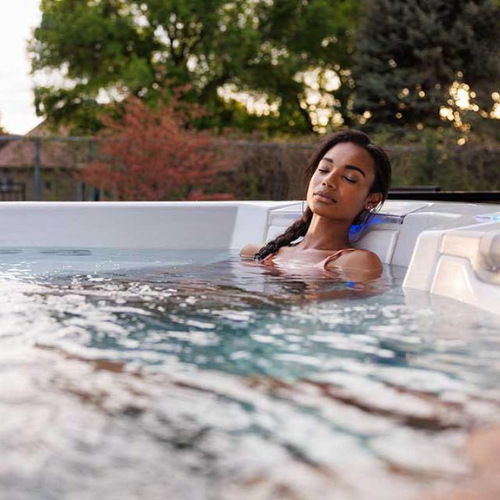Did you know that between 50 and 70 million adult Americans experience some form of sleep disorder? In fact, one in three people say they take sleeping medication before going to bed every night. You’d think that with the widespread issue of restless sleep in our nation, more individuals would turn to natural sleep aids rather than taking pills. It seems like a hot tub soak would be the solution.
Hydrotherapy techniques like hot tubbing have been shown to enhance general well-being. According to studies, hydrotherapy can reduce pain and anxiety, and improve blood flow and immunity. It may even help you sleep better.
The American Sleep Association estimates that one-third of adults get less than seven hours of sleep every night. Poor sleep quality is frequently to blame for this, but there are a number of other factors that can also play a role.
Do hot tubs help you sleep? Sure, soaking in the hot tub before bed can improve the quantity and quality of sleep!
A NCBI study found that taking a hot soak in the evening increased drowsiness at bedtime and promoted deep, slow-wave sleep.
Another study was conducted at the University of Sao Paulo in Brazil to see if passive body heating (immersion in hot water) could help fibromyalgia sufferers sleep better. The outcomes showed that the patients’ time to fall asleep had decreased, and they had a quicker onset of REM sleep, the deepest stage of sleep. Also, they woke up less frequently during the night and spent less time tossing and turning.
Why does using a hot tub aid sleep?
The temperature
One of the main things that affect sleep is temperature. Our core body temperature must decrease a few degrees in order for us to go to sleep and stay asleep. Naturally, this takes place each night just before bed. Your core body temperature will increase while you soak in a warm hot tub at night, and then it will quickly fall as you go off to sleep. This quick dip in body temperature is thought to help you relax and help you fall asleep deeper.
Reduces anxiety and stress
Slipping into the hot tub could help you relax if you deal with insomnia as a result of ongoing stress. Our ability to sleep is directly impacted by anxiety. Our bodies are unable to relax and go to sleep while we are under constant stress. This is due to the fact that our sympathetic nervous system is continually in a state of “fight or flight,” which causes the body to continuously emit neurotransmitters like noradrenaline, dopamine, and adrenaline, all of which boost alertness (the opposite of what should happen at bedtime). Your muscles and nerves will relax while you soak in the hot tub, which will help you sleep better at night.
Eases pain
You already know how unlikely it is to get a decent night’s sleep when your body is in any form of pain. Pain makes it seem impossible to go asleep, whether it’s from a twisted ankle, a sore throat, or a persistent lower backache. Inflammation and soreness can be reduced by soaking in the hot tub. One reason is that warm water widens blood vessels and boosts circulation, which makes it easier for cells to reach the site of an injury and perform their functions more quickly. In one study of athletes, the usage of hot tubs and other forms of water immersion therapy was found to help in recuperation.
Water immersion also lessens the force of gravity acting on joints. It provides 360-degree limb support, relieving pressure on the entire body.
The Best Time to Relax in the Hot Tub
An excellent method to lessen aches and pains is to spend 20 to 30 minutes sitting and soaking in the hot tub. But be careful not to stay too long. Take a 15-minute pause from the hot tub if you start to feel faint, lightheaded, or overheated. Hot tubs have several uses besides just relaxing. They have the ability to replace valuable lost sleep hours. Always remember to stay hydrated before and after using your hot tub if you want to enjoy all of its health benefits. Our general health and well-being depend on sleep. It’s critical that we preserve it.













